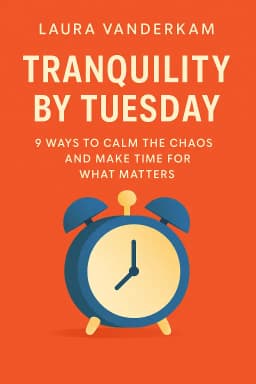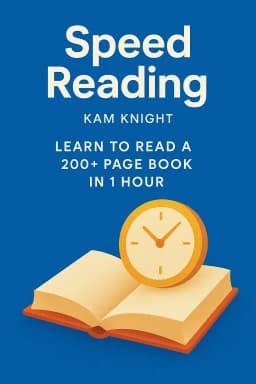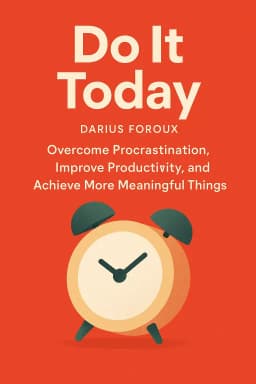
The Genius of Doing Less
Why You Get More Done When You Work Less
Golden Hook & Introduction
SECTION
Mark: Alright, here’s a thought experiment. What if I told you that the secret to being more productive, more creative, and more successful isn't working harder, but working less? A lot less. Like, four hours a day less. Because that's what some of history's greatest minds did. Michelle: Okay, hold on. Four hours a day? That sounds like a great way to get fired, Mark. Or at the very least, to get a very concerned email from HR. Who are these four-hour-a-day titans of industry? Mark: It's not a fantasy, Michelle. It's the central argument of a fascinating book called Rest: Why You Get More Done When You Work Less by Alex Soojung-Kim Pang. And it’s packed with examples of people who changed the world on what we’d consider a part-time schedule. Michelle: I'm intrigued. Who is this author telling me to work less? I feel like I should send him a gift basket. Mark: What's so compelling is that he's not some guru living in a monastery. Pang is a Silicon Valley consultant and futurist with a Ph.D. in the history of science. He got the idea for this book after facing his own near-burnout. He was in the heart of 'hustle culture' and realized it was a broken model. So he used his skills as a historian to investigate how the most creative and productive people in history actually worked. Michelle: Ah, so he’s a refugee from the land of 80-hour work weeks. That gives him some serious street cred. He’s seen the dark side. Mark: Exactly. And his investigation led him to uncover this first, mind-blowing idea: for history's most creative people, work and rest weren't enemies. They were partners.
The Counterintuitive Power of 'Deliberate Rest'
SECTION
Michelle: Partners? What does that even mean? My work and my couch feel like they're in a permanent custody battle over my time. They are definitely not partners. Mark: That's the modern view! We see rest as the absence of work. Just stopping. But Pang argues that the people he studied practiced something he calls 'deliberate rest.' It’s an active, strategic skill. And the perfect example is Charles Darwin. Michelle: Darwin? The evolution guy? I'm picturing him hunched over a desk for decades, scribbling away about finches. Mark: That’s the myth. The reality is, Darwin’s workday was shockingly short. His son, Francis, kept detailed records. Darwin would wake up early, take a short walk, and then work in his study from 8:00 to 9:30 AM. That was his most intense, focused work period. Michelle: An hour and a half? That’s my first meeting of the day. Mark: Right? Then he’d read his mail and from 10:30 to noon, he’d do another session of work. And that was it. His serious work for the day was done by noon. After that, he’d take a long walk with his dog, answer letters, take a nap, read a novel to his wife, and just think. In total, maybe four hours of focused work a day. Michelle: Okay, but let's be real. Darwin was a wealthy 19th-century naturalist. He had an inheritance. He wasn't worried about a mortgage or a performance review. How does his schedule apply to a modern knowledge worker? We can't just wander off into the countryside for three hours. Mark: That's the exact question the book tackles. It’s not about copying his schedule, but understanding the principle behind it. The science backs him up. In the 1950s, researchers at the Illinois Institute of Technology studied the productivity of scientists. They found an M-shaped curve. Productivity shot up when scientists worked between ten to twenty hours a week. Michelle: Ten to twenty? That’s a dream. Mark: But after twenty-five hours, their productivity flattened. And get this—scientists who worked thirty-five hours a week were only half as productive as their twenty-hour-a-week colleagues. The ones who worked sixty-plus hours a week? They were the least productive of all. Michelle: Wow. So all that 'face time' at the office, staying late to look dedicated... it's not just pointless, it's actively counterproductive. Mark: It's performance art. We're 'performing busyness.' The real work, the deep creative work, happens in short, intense bursts. And the rest of the time, our brains are still working. That's where the science gets really cool. Neuroscientists have discovered what they call the 'default mode network,' or DMN. Michelle: The DMN. Can you break that down for us? What is my brain actually doing when I'm staring out the window instead of finishing a report? Mark: Your brain is anything but idle. The DMN is a network of brain regions that lights up when you're not focused on a specific, external task. It's active when you're daydreaming, remembering things, or imagining the future. It’s the part of your brain that connects disparate ideas, that has those 'aha!' moments in the shower. When Darwin was on his long walks, he wasn't just 'off.' His DMN was firing on all cylinders, consolidating his observations and making the creative leaps that led to his theory of evolution. Michelle: So that rest period is actually a different kind of work. It’s the subconscious shift. The brain is still on the clock, it's just in a different department. Mark: A perfect way to put it. Deliberate rest isn't about stopping work. It's about giving your brain the space it needs to do its best work. You do the focused preparation, then you step away and let the DMN connect the dots. That's the partnership.
The Practical Toolkit for a Restful Life
SECTION
Mark: And that's the key. It's not about being idle. It's about using specific, powerful rest techniques. Darwin's walk wasn't just a walk; it was part of a toolkit. And this book is full of them, these hidden habits of top performers. Michelle: Okay, I'm ready for the toolkit. Give me something I can use. I can't take a three-hour walk, but maybe there's something else. Mark: There is. Let's start with a really simple but powerful one: the strategic stop. This comes from another master, Ernest Hemingway. Michelle: The writer. Another guy who probably had a pretty flexible schedule. Mark: True, but the principle is universal. Hemingway had a rule. He would always stop writing for the day at a point when he was going well and, crucially, when he knew exactly what was going to happen next. He'd even stop mid-sentence. Michelle: That sounds agonizing. Why would you stop when you're in the flow? That's the moment we all chase! Mark: Because, as he put it, "That way your subconscious will work on it all the time." He knew that if he stopped at a difficult point, he'd dread coming back to the blank page the next day. But by stopping at an easy point, he was essentially leaving a breadcrumb trail for his brain. He’d wake up, the next sentence would be waiting for him, and he could dive right back into the flow. Michelle: Huh. That's clever. It's like leaving the key in the ignition overnight. You're priming your brain to start effortlessly the next morning. So how could I, say, an accountant, use that? Do I just leave a spreadsheet half-finished? Mark: Maybe not mid-formula, but you could stop after organizing the data for the next big task, but before you start the analysis. You stop when the next step is clear and easy. It lowers the activation energy to get started again, which is where so much procrastination comes from. It’s a small trick, but it completely reframes the end of your workday from a hard stop to a gentle handoff to your subconscious. Michelle: I like that. A handoff. Okay, what else is in this toolkit? Mark: Let's talk about a bigger concept: 'deep play.' This is different from just relaxing. Pang defines deep play as an activity that is mentally absorbing, challenging, and rewarding in its own right. And it often uses similar skills to your main work, but in a totally different context. Michelle: So, is scrolling TikTok deep play? Because it's mentally absorbing, but I don't feel particularly restored afterwards. Mark: Exactly. That's shallow distraction. Deep play is something more substantial. The best example from the book is Winston Churchill. In 1915, he was at the lowest point in his career. He was blamed for the disastrous Gallipoli campaign in World War I, a failure that cost thousands of lives. He was disgraced, forced out of his high-ranking position, and plunged into a deep depression he called his 'black dog.' Michelle: I can't even imagine that kind of pressure and public failure. Mark: It was crushing. And what did he do? He took up painting. He was in his forties and had never painted before. He started tentatively, but soon it consumed him. He wrote a whole essay about it called 'Painting as a Pastime.' He said that for a mind under intense strain, simple rest isn't enough. You can't just switch it off. You need to give it something else to chew on, a new problem to solve. Michelle: So it's like cross-training for the mind. Mark: Precisely. Churchill saw painting as a battle. He wrote about the challenge of the blank canvas, the strategy of choosing colors, the tactics of brushstrokes. It engaged the same parts of his mind that he used for military strategy and political maneuvering—judgment, planning, bold action—but without the life-and-death stakes. It restored his confidence and gave him a sense of control when his political world was in chaos. Michelle: That's fascinating. So deep play isn't an escape from your skills; it's a new arena for them. It recharges the core batteries you use at work, but in a way that feels like play. Mark: Yes! And that's why it's so restorative. It provides the same kind of psychological satisfaction as work—a sense of mastery, progress, and challenge—but in a low-stakes environment. It builds your resilience and gives you new perspectives that you can bring back to your actual work.
Synthesis & Takeaways
SECTION
Michelle: So what I'm hearing is that our whole modern idea of productivity is broken. We treat our brains like machines we can run 24/7, but the most brilliant minds in history treated their brains more like a garden—needing periods of intense cultivation, but also deliberate periods of sun, water, and rest to actually grow anything worthwhile. Mark: That's a beautiful way to put it. We're obsessed with the 'work' part of 'work-life balance' and we treat the 'life' part as whatever is leftover. This book flips that. It argues that a rich, restful life is the foundation for great work, not the reward for it. The book is widely acclaimed for this reason, it really resonates with people feeling the strain of modern work culture. Michelle: It feels like permission to stop feeling guilty about rest. To see it as a strategic choice, not a moral failing. Mark: Exactly. And the book's ultimate message is that rest isn't a reward you earn after you're exhausted. It's the investment you make to prevent exhaustion and do your best work in the first place. There's a fantastic quote from the book that sums it all up: "When we stop and rest properly, we’re not paying a tax on creativity. We’re investing in it." Michelle: 'Investing in creativity.' I love that. It completely changes the frame. It makes you wonder, what's one small act of 'deliberate rest' you could schedule into your day tomorrow? Not just collapsing on the couch, but something that truly recharges you. Mark: A question worth resting on. This is Aibrary, signing off.









